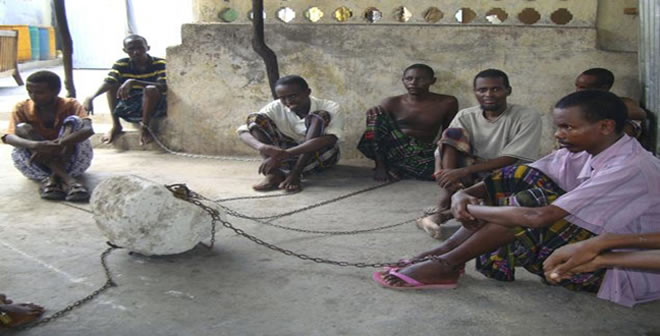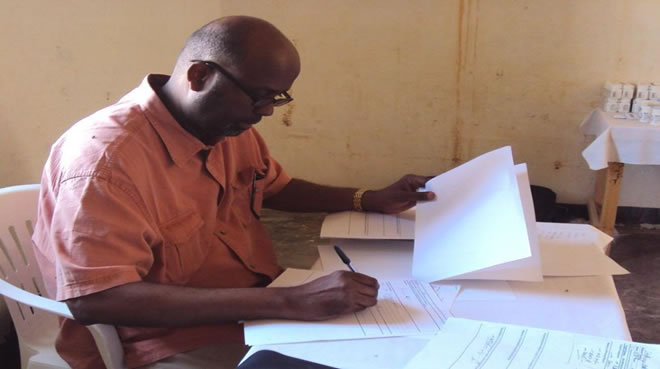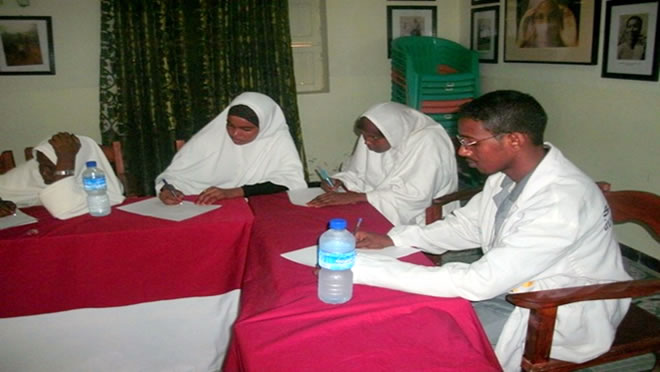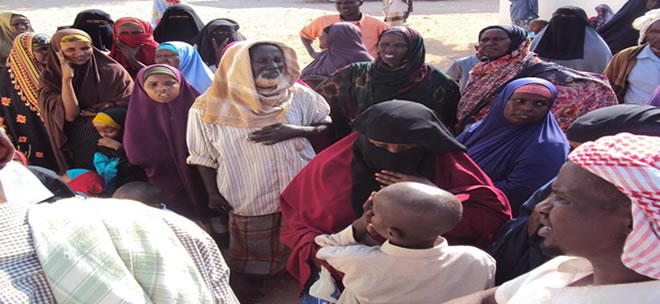by Farhia Ali Abdi
Sunday, August 11, 2013
“Mental health needs a great deal of attention. It's the final taboo and it needs to be faced and dealt with” Adam Ant.

In this photo, chained mentally ill patients sit within a mental health center in Mogadishu, Somalia. Source: The Hindu
The past and present capacity:
Given the Somalia political and economic turmoil suffered during the civil war, the country’s mental health system collapsed, and mental health disorder became rampant across the country. To date, government in Somalia does not have an official mental health plan of action to combat mental illness, rebuild facilities, and grant funding to support programs. The apparent lack of medicine, and adequately trained staff and professionals have forced families, and mental health centers to chain their patients to beds or rocks as it shows in the picture above, leaving them with permanent trauma and physical injuries.
World Health Organization (WHO) indicated in their recent study of Somalia’s mental health care that people with mental illness in Somalia face degrading and dangerous cultural practices such as being restrained with chains, which are not only widespread, but also socially and culturally accepted. WHO further expressed that Somalia has one of the world highest rates of mental-health disorder. Approximately, one-third of its eight million Somalis are affected by some kind of mental disorder, yet there are only three trained psychiatrists in the entire country who specialize in mental illness. Psychiatry as a profession is heavily stigmatized in Somalia by both the general public and the medical community. Healing for mental problems is provided by religious leaders or by traditional healers, and it has become an ineffective method in the current Somalia society.
Historical Context:
The country established a health care system after its independence in the 1960s; however, in the 1970s, there were few noticeable achievements with the military regime run health care system such as the creation of medical schools in Mogadishu and in Hargeisa (Nursing). Nonetheless, problems within the country’s meager national health care system were exacerbated by the state’s collapse in 1991. At this time, the healthcare system suffered a major setback and forced many Somalis to go without proper health care.
In a conceptual framework, Somali culture considers mental health as one is either “crazy or not crazy." There is no assortment of health and disease, mental health and mental illness. People’s beliefs and understanding of mental illness are predominately spiritual and metaphysical: mental illness comes from evil spirits; it can be brought on by another person or oneself through curses or bad behavior. These beliefs, coupled with the lack of a strong plan on mental health in the government at the federal, regional, and local levels, deepen the country’s mental health crisis. According to, a 2010 World Health Organization report: “A Situation Analysis of Mental Health in Somalia," medical education and training of health professionals is a key issue for the health sector as a whole. There are no medical institutes, universities and schools that have an internationally recognized and standardized curriculum. The only exception is the Nursing School in Hargeisa, recognized by WHO. They further noted that, there is one private medical school in Gaalkacyo, the Gaalkacyo University, which started in 2006, the first basic training program for Assistant Physicians (three-year course). In the South, the Benadir School covers the whole South-Central Zone. Aside from Somaliland, there has been no effort to introduce curriculum focused on mental health curriculum into the basic teaching package. The lack of resources, including, medical equipment, and administer medications and treat emerging high rates of trauma-related disorders throughout the country, requires an urgent attention.
Contemporary Somali Society:
Since the aftermath of the civil war, there is an apparent change in the perceptions and stigma regarding mental health. The causes of mental illness are now understood as chemical imbalance rather than a bad spirit. Specialized mental health professionals in the diasporas and locals in Somalia brought a new approach of looking at mental illness diagnosis and treatments, and in so doing, reduce the barrier to seeking care. Their efforts are already making a huge difference in how people view mental health disorders and to seek information to improve their conditions. For example, in Mogadishu, there are few mental health facilities run by Abdirsaq Ali Habeeb. Mr. Habeeb is a Psychiatry Nurse by training and operates mental health centers to care for inpatients and outpatients with the support of NGOs such as the World Health Organization and other donors. Mr. Habeeb who is living in Mogadishu goes out to the streets of Mogadishu to find chained, mentally ill persons; he unchains them and brings them to his facilities for care, thus restoring their dignity. In Somaliland, there are similar public and private mental health centers with the same patient treatments and outcomes. These facilities are sustained by the support of few donors and NGOs such as the World Health Organizations (WHO).
The new understanding of mental health illness in Somalia is partially due to the contribution from Somali diaspora professionals who are returning home. Good example is the recent opening of Somalia Mental Health Foundation Centre in Puntland region by Dr. Abas M. Jama and his colleague Mr. Hassan M. Esse. Dr. Jama and his colleague Mr. Esse are Somali diaspora professionals and the founders of The Somalia Mental Health Foundation. Their foundation is a non-profit organization that provides services and guidance for people with mental health conditions. One of the program’s mandates is to develop adequate facilities with highly qualified mental health professionals for the diagnosis and treatment of mental, neurological and psycho-social disorder. Furthermore, the mandate states that the foundation is to set up mental health camps where psychiatric consultation and medicines are provided free-of-charge. What is unique about this particular organization is that, it is initiated and run by Somali diaspora professionals who decided to dedicate their time and effort to support other Somalis inside the country, and one that I hope others follow suit.
Dr. Jama is a well-respected Psychiatrist by training in the United States. He has a private practice in Sandusky, Ohio and specializes in adult psychiatry. He is a member of the Medical Staff of Firelands Regional Medical Center and Firelands Physician Group, Mercy Hospital in Lorain, Ohio and a member of the American Medical Association and American Psychiatric Association.

Dr. Abas M. Jama in Somalia
Dr. Jama recognizes the need to treat individuals who are suffering from mental illness in Somalia as a result of the prolonged civil war, and the absence of proper mental health centers to treat these individuals. Hence, Dr. Jama and his colleagues opened their first office in Qardha, Puntland, and are working their way throughout the country to treat mental illness. The facility is run by Abdiqani Abdullahi Askar who has a Bachelor of Nursing Degree and Medical Psychiatry Training Certificate. Since opening the clinic in 2011, Dr. Jama and Abdiqani have treated over 4000 patients and returned to the region twice to train nurses, educate patients and their family members, and dispense medication.
Dr. Jama’s vision in Somalia is to establish collaborative working relationships with the medical community and hospitals in Somalia in order to facilitate needed medical training to care for mentally ill patients. The top priority for this year he said is to provide and develop educational training programs. To this end, Dr. Jama (The Somali Mental Health Foundation) in partnership with the existing Mental Health Centers in Somali such as Mr. Habeeb’s run facilities in Mogadishu will conduct a two-four week of educational course on mental illness to nurses, nurse practitioners, and aides who live in Mogadishu and the surrounding region. The training program will be offered in three different cities in Somalia. Moreover, as part of this course, Dr. Jama will train approximately 60-100 nurses and aids in Somalia in the effort to give the participants the necessary tools and knowledge desperately required to treat mental illness.

Somali Mental Health Foundation training event in Galkayo, Somalia - May 2013
More than providing education, Dr. Jama and his colleagues are changing societal views on mental illness by helping to lessen the stigma surrounding mental illness in Somalia. By this, they are providing the platform for sufferers to seek needed medical care for their illness. In Puntland regions, the municipal officials are putting requests to Dr. Jama to train the hospital staff in order to care for patients. As seen from video clips on their website: http://somalimentalhealthfoundation.com/ people are lining up for treatments. A recent interview on Somali TV, the Dr. and his colleague Mr. Esse expressed an overwhelming experience by the new patients who for the first time since their illnesses were released from their chains

Line up in front of the Somali Mental Health Foundation, Qardha Center. November 2011
Though there are no monitoring oversight bodies except for the mental health institutions that regularly monitor patients at health facilities, this is a tremendous achievement on the onset of fighting mental illness in the country.
Advocacy and Public Education and Awareness
In an interview with Al-Jazeera TV, 2011, Mr. Habeeb who runs the Mental Health Centre in Mogadishu said, “I believe there is no one with good mental health in Mogadishu or in the entire South and Central Somalia because of what is going on. Normal people will not kill and maim their own, and for such a long time.” This is true for the entire country and there are dire needs for trained and educated professionals within the field of Mental Health and on the health field in general. The 2001 UN Development Programme's Human Development Report, ranked Somalia lowest in all health indicators except life expectancy. In its latest report, the country is not even ranked due to the lack of reliable data. Somalia needs human resources for medical health development who can deliver integrated primary health care services. The backbone of any health care system is the mental health and in order to maintain and encourage a culture in which respect and healing for the mentally ill are a priority, there needs to be an education. The new concept of training medical practitioners as exemplified by Dr. Jama and his colleagues has been successful, and it should be considered as a viable strategy for treating mental illness in Somalia and enhancing community awareness of mental illness.
Due to the long neglect of mental health issues in Somalia, and the long-held beliefs on mental illness, the country needs Somali community organizations, and community health centers such as the one developed by Dr. Jama, Mr. Esse, and Mr. Habeeb. Somali led mental health treatment, and training is the best hope for Somalia. Dr. Jama’s actions will hopefully encourage other diaspora professionals to invest back to the country. The efforts of these professionals have led to many successes, and Somalia continues to benefit from their tireless efforts and much-needed expertise in establishing a comprehensive strategy for battling mental illness in Somalia. Creating community awareness and empowerment in the area of mental health is a key to treating the disease and with the training and support from the international NGO also, will position Somalis to further improve mental illness. The current Somali government also needs to encourage, support, and partner with Somali professionals with mental health expertise to create mutual support, conduct advocacy and influence the policy-making process in line with international human rights standards.
The way forward for mental health policy implementation is to.
· Establish a centralized public health institution mandated in managing the Mental Health program and services in the country.
· Integrate mental health into the primary health care services, so mental health care can be seen as an essential aspect of health care.
· Create a clear, well communicated future vision for the healthcare system, and to consider mental health research findings that can be used most effectively in influencing the delivery of services.
· Assist in capacity building on the community-level models of care that effectively involved in mental health treatment and delivery of services.
· Support service providers and users alike to understand and promote human rights, recovery and rehabilitation of mental illness, and to recognize mental health as a crucial component of personal health.
· Lastly, build and maintain a health care related database in the country.
Farhia Ali Abdi
[email protected]